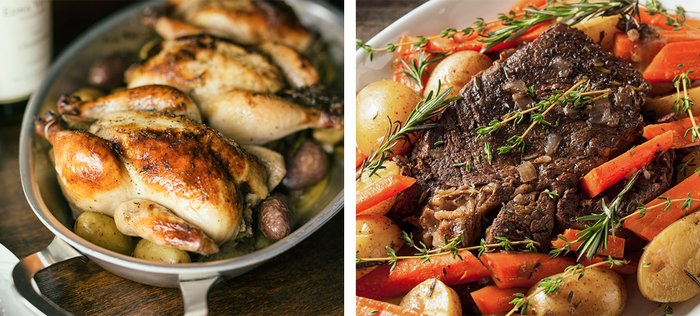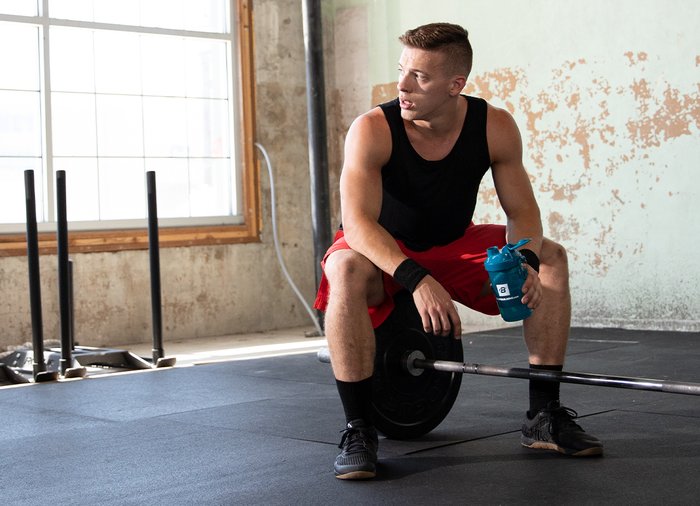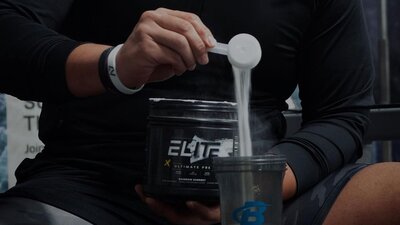CarnoSyn beta-alanine is a lot like creatine in one major sense. When creatine first came out, it only had a little bit of research behind it. Plenty of my colleagues said, reasonably, that they weren't going to accept it until there was more research. But guys like me, who were both in the gym and in the lab, realized right away that it was extremely effective. Over the years, the research on creatine has piled up, and now both camps can agree. No doubt about it, creatine is safe and effective.
CarnoSyn beta-alanine is on the same track as creatine was back then. I've been talking about beta-alanine for years, and now the growing body of research shows just how effective this amino acid is for muscle strength, muscle power, endurance, muscle growth, and possibly even helping with fat loss. It's one of the hottest ingredients on the market, and it's also one that consistently lives up to expectations.
Beta-alanine, I can say with plenty of experience, is great, and CarnoSyn beta-alanine is without a doubt the best form of it I've come across.
Here's what you need to know in order to get the most out of this proven performance-boosting ingredient.
What Is Beta-Alanine?
Beta-alanine is a nonessential amino acid that's produced naturally in the liver. You also get it in your diet from meat sources, such as beef and poultry. In the body, beta-alanine, whether from the liver or ingested from food or supplemental CarnoSyn beta-alanine, is taken up by the muscle fibers and combines with the amino acid histidine to form the dipeptide (a two amino acid protein) carnosine. Carnosine is the end product that provides the benefits associated with CarnoSyn beta-alanine.

What Does Beta-Alanine Do?
Taking CarnoSyn beta-alanine leads to higher levels of carnosine, which is important because carnosine enhances performance by increasing the muscle's capacity to buffer hydrogen ions. These are produced when lactic acid levels rise during intense exercise, such as weight training.
The lactic acid breaks into hydrogen (+) and lactate (-) ions. When there are a lot of hydrogen ions in the muscle, it increases the muscle's acidity, which decreases your ability to contract the muscle. That, in turn, causes it to lose endurance. So, by buffering the hydrogen ions, carnosine keeps your muscles contracting stronger for longer.
CarnoSyn beta-alanine also has some benefits that are separate from those of carnosine. Because of its structure, beta-alanine is now being recognized in the lab as a neurotransmitter, which means that it increases nerve firing in the central nervous system.
That's just one reason why it's a good idea to take CarnoSyn beta-alanine before workouts and why it's found in numerous pre-workout products. It's also the reason that beta-alanine often causes that prickling sensation, or "pins and needles," in the skin—known as paresthesia. This feeling is completely normal and harmless, and it increases with higher doses of beta-alanine.
What Are the Physique and Performance Applications of Taking Beta-Alanine?
The main reason to take CarnoSyn beta-alanine is to buffer hydrogen ions, allowing you to maintain muscle strength and power during a workout. That doesn't mean you can take beta-alanine, walk into the gym, and increase your bench press by 20 pounds, though.
Let's take a typical chest workout as an example. Say you start with the bench press, move to the incline press, and then do dumbbell presses, flyes, and cable cross-overs, maybe 3-4 sets of each exercise. As you go through the bench press sets, you're not fatigued yet. You've got a lot of energy and you feel strong. As you keep going, your chest muscles, shoulders, and triceps get tired. If you came back and did more bench presses at the end of your workout, you'd notice that your strength is significantly lower than where you were at the start.

That's muscle fatigue. You need to recover for several hours, if not days, to get back to where you were at the beginning of that workout in terms of strength and endurance. Beta-alanine helps you minimize the strength loss as you go along in your workout. It's not the kind of endurance where, say, a runner will really benefit from it on a long run. It's more like strength endurance, if you will.
Having more strength later on in a workout can be crucial to not only your strength gains but also your muscle growth. It can help with fat loss as well, because you're able to do more work. So you burn more calories after the workout as well as during it.
What's the Right Dose of CarnoSyn Beta-Alanine to Take?
There's a lot of confusion about dosing when it comes to beta-alanine—both when and how much. The information is all over the place, depending on who you listen to and what research you look at. With CarnoSyn beta-alanine, the minimum dose for achieving optimal results is 3.2 grams per day. The optimal range is 3.2-6.4 grams per day.
This comes with a caveat, however: It takes longer than a single day's dose to reach muscle saturation levels of beta-alanine. The 3.2-6.4 grams recommended is based on research showing muscle-building benefits in athletes who took at least 90 grams of beta-alanine—and as much as 179 grams—over a 28-day period, 3.2 and 6.4 grams per day, respectively.[1]

It's the same with creatine: it goes to the muscle, but you don't start seeing much in the way of effects until your muscles are saturated with it.
Because supplementing with CarnoSyn beta-alanine is more about saturating the muscles (and after that, keeping them saturated) than any acute, immediate effect, the minimum daily dose of 3.2 grams can be divided into separate doses. I recommend taking two doses of 2 grams per day, one before you work out and the other post-workout. This delivers a total of 4 grams per day, which is within the dosing window.
Why not take it all at once? If you take a 4-gram dose of beta-alanine, you're almost definitely going to get that tingling feeling. Some people like that feeling, but others don't, especially when it becomes excessive. It's harmless, but in this case, it's also avoidable.
When Should You Take Beta-Alanine?
Since the uptake of nutrients improves around workouts, I recommend taking the first dose of beta-alanine 30-60 minutes before training. Research shows that blood levels of beta-alanine peak within 30 minutes of taking it, and it completely leaves circulation within three hours. So it makes sense to get in a 2-gram dose of beta-alanine 30-45 minutes before your workout and then immediately after training.
There have also been a number of studies that show the effectiveness of split daily doses of beta-alanine. In most cases, they concluded that any two times of day work. So why do I say pre- and post-workout is best? A major reason is convenience.
Are you honestly going to stop in the middle of your day, at work or at school, and say, "Oh, I need a dose of beta-alanine"? When during the day will you stop to focus on supplementation? Maybe when you wake up first thing in the morning, but more likely, it's pre- and post-workout.
Should You Take Beta-Alanine on Rest Days?
For maximum benefit, yes, you should take CarnoSyn beta-alanine on rest days. As I said earlier, you're not taking beta-alanine for the acute, immediate effect; you're taking it to saturate the muscles, whether it's a training day or not. Research has also shown that it's similarly important to keep those beta-alanine levels "topped off" after you've reached saturation.

Now, missing one day of beta-alanine probably won't affect your muscle saturation levels, but if you're doing a program like Shortcut to Size, where you only work out four days a week, I recommend taking a dose or two on at least two of your rest days.
How Should You Stack Beta-Alanine?
CarnoSyn beta-alanine is almost a standard ingredient in pre-workout mixes these days, and for good reason. The slight mental boost it can impart goes well with caffeine, other amino acids like tyrosine, and nootropics like Huperzine A to increase clarity and focus.
Beta-alanine also works well with creatine. One study found that when a group took beta-alanine along with creatine for 10 weeks, subjects gained significantly more muscle than a group taking just creatine.[2]
In the same study, the subjects in the beta-alanine and creatine group also lost body fat while gaining muscle without changing their diet or workout program. The creatine-only group lost no body fat. So, in my book, taking it with creatine is a no-brainer.
Are There Any Side Effects from Taking Beta-Alanine?
Aside from the paresthesia, there are no significant side effects from taking CarnoSyn beta-alanine. That said, I can't tell you how many people have emailed me saying, "Oh, my god, I took beta-alanine, and something's wrong with my lips and my ears!" They don't like it. If you feel the same way or suspect you might, I would definitely recommend spacing out your doses.
What's the Bottom Line?
So many athletes have told me that CarnoSyn beta-alanine was a game-changer for them. If you train hard and want to get the most out of your time in the gym, I highly recommend it for your stack.
When looking for products that include beta-alanine, be sure to look for the CarnoSyn brand logo on the label. CarnoSyn is the only beta-alanine that has successfully obtained New Dietary Ingredient (NDI) status with the FDA, and touts more than 20 published scientific studies, supported claims, proven performance, and patent protection around the world. It's the most trusted brand when it comes to quality, purity, and effectiveness.
References
- Stout, J.R., et al. (2006). Effects of twenty-eight days of beta-alanine and creatine monohydrate supplementation on the physical working capacity at neuromuscular fatigue threshold. Journal of Strength and Conditioning Research, 20(4), 928−931.
- Hoffman, J., et al. (2006). Effect of creatine and beta-alanine supplementation on performance and endocrine responses in strength/power athletes. International Journal of Sport Nutrition and Exercise Metabolism, 16, 430−446.

